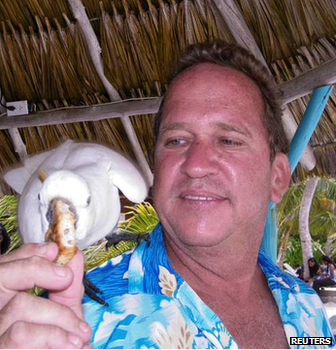The final years of John McAfee's controversial life
- Published

McAfee founded an anti-virus company of the same name, in 1987
In 2012, the game appeared to be up for John McAfee.
After going on the run in Belize, he had been arrested in Guatemala after his neighbour was found dead. The police described him as a "person of interest" in the case.
However, as in many situations in his life, he somehow managed to wiggle free.
McAfee shot to fame in the 1980s, after launching an anti-virus software company he named after himself.
His success brought with it money - but throughout his life, McAfee seemed almost as good at losing money as he was at generating it.
In 2008, he had moved to Belize, where he ended up living next to man called Gregory Faull.
In November, 2012, Faull was murdered in his home.
"The entire five years I was there, I'd said maybe 15 words to him," McAfee told the BBC's Leo Kelion.

Gregory Faull was found shot dead at his home in Belize
But their relationship apparently broke down over dogs McAfee believed had been poisoned.
"There was no ongoing argument," he told BBC News.
"Yeah, he was mad about my dogs.
"Maybe, as I'm beginning to think now, maybe he was the one who poisoned them.
"At the time, I certainly did not believe that."
Free man
In fact, as ABC News later revealed, external, Faull had filed a complaint about McAfee's dogs - saying one had attacked a tourist.
Whatever the truth, when the police came looking for McAfee, he was not around.
He was living with a 17-year-old girl at the time and the police discovered a large number of weapons in his home.
When they eventually caught up with him, in Guatemala, many believed McAfee would be tried for Faull's murder.
But within a week, he was released and allowed to fly to Miami - a free man.
"After it was over, I asked myself, 'Good Lord, I must have been afraid?'" he told BBC News.
"But I really can't remember."
Money-making ideas
Faull's murder hung over McAfee for the rest of his life.
In 2019, a Florida court ordered him pay $25m (£18m) to Faull's estate in a wrongful death claim.
However, on his return to America, he characteristically went about pursuing new money-making ideas - settling in Lexington, Tennessee.
In 2016, McAfee announced he wished to run as a presidential candidate for the Libertarian Party.
He campaigned to end the "war on drugs" and bulk up US defences against cyber-security attacks from China and Russia.
But he was unsuccessful.
Better luck
Around this time, McAfee started to promote crypto-currencies.
And at first, he appeared to have better luck in his business ventures than his political career.
He used his public platform to promote so-called alt-coins - crypto-currencies set up as rivals to Bitcoin.
And in 2018, The Verge reported, external he was charging $105,000 per tweet to promote initial coin offerings.
He also threw his weight behind an "unhackable" crypto-wallet - which was then hacked.
But the way he was promoting crypto-currencies would later draw the attention of the US Securities and Exchange Commission (SEC).

John McAfee played up to his bad-boy reputation - claiming to have 47 children
Certainly according to the filings of Tennessee prosecutors, McAfee appeared to be doing well financially.
And in October 2020, he was arrested in Spain as he was about to board a plane to Turkey.
He was accused of failing to file tax returns for four years, despite earning millions from consulting work, speaking engagements, crypto-currencies and selling the rights to his life story.
Prosecutors believed McAfee owed $4,214,105 in taxes between 2014 to 2018, the Associated Press news agency reported.
And the US Justice Department alleged he had evaded tax liability by having his income paid into bank accounts and crypto-currency exchange accounts in the names of nominees.
He was also accused of concealing assets, including a yacht and real-estate property, also in other people's names.
'Go dark'
While in prison in Spain, McAfee was indicted, external on further changes.
The SEC accused him of fraud and money laundering over his use of social media to promote crypto-currencies.
He later told his Twitter followers he planned to "go dark" on social media after receiving "threats" from the SEC.
The US government had ulterior motives in requesting his extradition, he said, and his attempt to run as a Libertarian Party candidate was a factor.
But on Wednesday, Spain's National Court found there was "no revealing evidence" he was being prosecuted for political or ideological reasons and authorised his extradition back to the US.
Dark twists
McAfee believed if he was extradited he would spend the rest of his life behind bars.
Within hours, he was found dead in his cell.
And his lawyer said he had killed himself.
Although he never fitted the mould of a Silicon Valley tech founder, his anti-virus company was hugely successful.
But he was also a complex and erratic man - whose colourful life was pockmarked with dark twists and acts of self-destruction.
And his final years were defined by characteristic exuberance and a nihilistic contempt for authority.
Related topics
- Published23 June 2021
